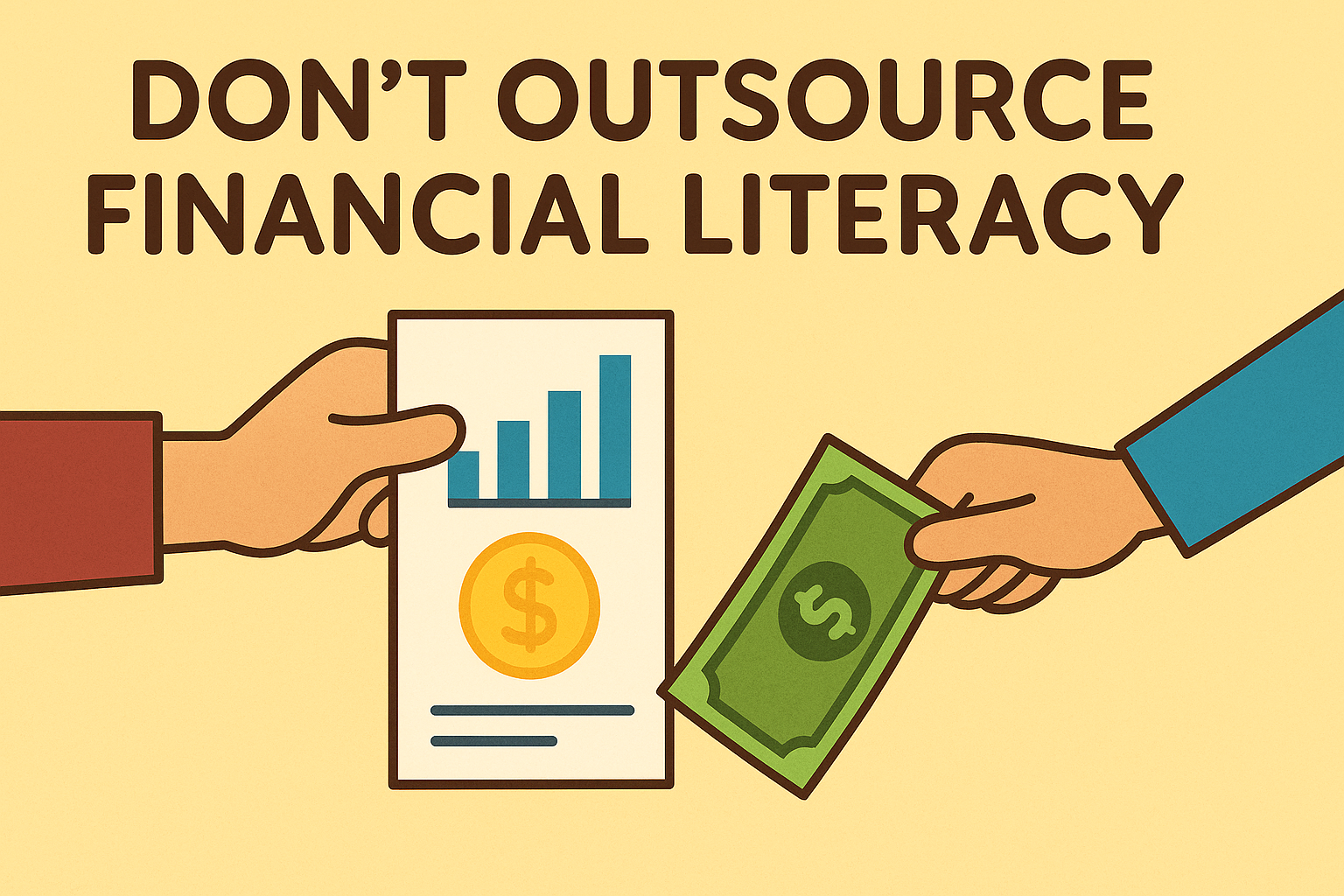Don’t Outsource Financial Literacy
Introduction: Why You Need to Understand Money
In an age of digital convenience, it’s easy to assume we can delegate everything including our finances. Robo-advisors, wealth managers, banks, and fintech apps promise to handle your money, simplify your decisions, and “do the work for you.”
But there’s a dangerous myth hidden in this mindset: the idea that you can outsource your financial literacy.
You can delegate tasks. But not understanding.
And when it comes to your money, that distinction matters more than ever.
Why You Still Need Financial Literacy – Even If You Use Professionals
You might be thinking: If I have a financial advisor or use a reputable bank, why do I need to understand finance myself?
The short answer: because no one will care about your money as much as you do.
Banks and advisors may act in your best interest, but their priorities, incentives, or knowledge of your life aren’t perfect. You need enough financial literacy to:
- Ask the right questions
- Recognize red flags
- Understand trade-offs and risks
- Avoid emotional decisions during market swings
- Say “no” to advice that doesn’t fit your situation
Financial literacy is not about doing everything yourself – it’s about being able to tell the difference between good advice and noise.
The Cost of Blind Delegation
Here’s what happens when people blindly trust others with their financial lives:
- They buy products they don’t understand: Whole life insurance as a retirement plan, structured products with opaque fees, or funds that underperform their underlying index.
- They get sold to, not advised: Many “advisors” are compensated by commissions or sales targets. Their advice is biased even if unintentionally.
- They panic in market downturns: Without a firm understanding of volatility, drawdowns, and long-term compounding, people sell low and buy high.
- They confuse convenience with competence: Apps that invest for you still require you to input the right goals and risk tolerance. Garbage in, garbage out.
Relying on others without foundational knowledge leads to poor decisions – not because others are malicious, but because no system is smarter than an informed human paired with good tools.
The Basics You Should Know No Matter What
You don’t need a PhD in finance, but you do need a grasp on the basics:
- Budgeting and cash flow: Know where your money goes. Every financial plan starts here.
- Time value of money and compounding: Understand how money grows and why starting early matters.
- Risk and return: Know that higher returns come with risk. Nothing is “safe and high yield.”
- Diversification: Don’t put all your eggs in one basket especially if that basket is your employer’s stock or a hot tip from a friend.
- Debt and leverage: Understand interest rates, credit cards, and when debt helps vs. when it traps.
- How financial advisors and products make money: Know how fees work—because fees eat returns.
With these basics, you can make informed decisions—or at least, know what you don’t know and ask smarter questions.
Financial Literacy is a Life Skill, Not an Option
You don’t need to be a mechanic to drive a car, but you need to know how to steer, brake, and avoid a crash.
Likewise, you don’t need to manage a hedge fund. But you do need to know:
- What your goals are
- How much you’re saving
- What you’re invested in
- How it performs over time
- What could go wrong
Financial literacy is like fitness. No one can work out for you. Instructors can guide you but you must still do the lifting.
But What If I Do Want Help?
Great! A good financial advisor or digital tool can be incredibly valuable – if you know how to work with them.
Use professionals for things like:
- Expertise in complex areas (estate planning, taxes, insurance structures)
- Access to tools and services you don’t want to manage yourself
- Time-saving execution
But don’t let “I have an advisor” be an excuse not to learn. Instead, aim for collaborative delegation – you understand the plan, and they help you execute it better.
Final Thought: Be the CEO of Your Financial Life
Think of your financial life like a business. You can hire accountants, consultants, and managers – but you are still the CEO. The strategy, vision, and key decisions are yours.
You don’t need to do everything yourself.
But you must understand what’s being done and why.
Because when things go wrong (and at some point, they will), it’s your future on the line, not theirs.

